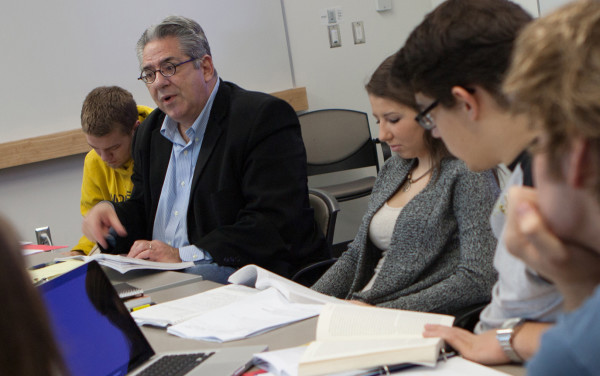At the start of the semester, students may note the absence of some of their professors as they take a leave of sabbatical. Professor Greg Kaster of the History Department is one such faculty member, and will be absent from campus until his return in September of 2015.
Professor Eric Carlson, Chair of the History Department, described the nature of sabbaticals at Gustavus and other institutions.
“It’s the same root as Sabbath, the seventh day, so it’s every seventh year, and the idea at Gustavus is that faculty will work either on a research project or perhaps developing a new course, or a combination of both,” Carlson said.
Carlson also noted that faculty have the option to either select half of an academic year at full pay or a full year at 2/3 pay.
Professor Kaster will be utilizing his sabbatical to research the perspectives of American slaves during the Civil War era.
“Like all researchers, I begin with a question, which then yields still more questions. What did freedom mean to runaway American slaves in the United States who escaped to free soil and subsequently wrote or spoke about their lives?” Kaster said.
He also explained that he intends to delve into specific examination of a variety of elements, and how the available slave narratives reflect how their authors conceptualized freedom.
“For example, did they understand freedom entirely or mostly in terms of the individual, or was there a social dimension as well? Did they understand it primarily in economic terms–i.e., the chance to own land and earn a living–or were there, broadly speaking, political and even philosophical dimensions as well? How did their understanding of freedom compare across genders? And did their understanding reflect or in any way challenge the dominant notions of freedom among their non-slaveholding contemporaries, including abolitionists?” Kaster said.
Kaster noted that he intends to build upon his experience in a seminar on slave narratives sponsored by the Council of Independent Colleges and the Gilder-Lehrman Institute which he attended at Yale University several summers ago. He also plans to primarily examine Benjamin Drew’s The Refugee: Narratives of Fugitive Slave in Canada Related by Themselves, a source brought to his attention by Yale historian David Blight.
“My goal for this leave is to complete most if not all of the research outlined above in Drew’s book and perhaps some other slave narratives, and to draft a very preliminary discussion of my findings that could form the basis of a future conference paper and perhaps an article for submission to an appropriate scholarly venue,” Kaster said.
History Professor David Obermiller also spoke about the broader function of independent research and how sabbaticals enhance the experience of students on campus.
“In general, when you get to have either that semester or year-long research project, you get to be an intellectual entrepreneur, which I think is a spirit we want to develop in our students, and so I think what it does is help us remind ourselves why we want to foster such efforts in our students, because it’s one thing to be a student and to receive and learn from your professors, but it’s a really different process when you are now given the opportunity to do your own independent research,” Obermiller said.
Though professors on sabbatical receive a break from duties on campus during sabbatical, there are expectations and preparations which must be met. Carlson noted that applicants for sabbatical must submit a proposal more than a year in advance and undergo a review by a faculty committee, demonstrating their intent and degree of preparation.
“It’s not just a paid vacation, and the idea is that even if it doesn’t directly seem to connect to the classroom, it just reenergizes us. Again, that notion of the Sabbath, that you take a day off and come back to work refreshed, well it’s the same notion that you work six years and you take some time off to read and reflect and write and be creative, and you come back to work refreshed so you’re a better teacher, just in a kind of abstract sense even if you don’t bring your project into the classroom in an explicit way. So it is an investment in teaching, even though it doesn’t look like it on the surface,” Carlson said.
Kaster, Obermiller, and Carlson all cited the benefits of taking time away from the classroom to research and rest, before returning to campus with renewed energy and inspiration to share with their students, and Obermiller remarked that sabbaticals are correctly viewed by many as a privilege rather than a right.
“Sabbaticals, in other words, are the lifeblood of a healthy and thriving faculty and college. In economic terms, they are an institutional investment in faculty that pays handsome dividends not just to faculty but to students and the institution itself,” Kaster said.
-Libby Larson
